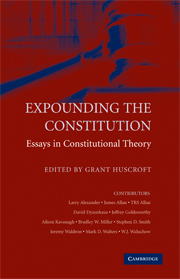Book contents
- Frontmatter
- Contents
- Preface
- Contributors
- Introduction
- PART I MORALITY AND THE ENTERPRISE OF INTERPRETATION
- 1 What Does Constitutional Interpretation Interpret?
- 2 Do Judges Reason Morally?
- 3 Constitutional Morality and Bills of Rights
- 4 Justification and Rights Limitations
- PART II JUDICIAL REVIEW, LEGITIMACY, AND JUSTIFICATION
- PART III WRITTEN AND UNWRITTEN CONSTITUTIONAL PRINCIPLES
- Index
1 - What Does Constitutional Interpretation Interpret?
Published online by Cambridge University Press: 25 July 2009
- Frontmatter
- Contents
- Preface
- Contributors
- Introduction
- PART I MORALITY AND THE ENTERPRISE OF INTERPRETATION
- 1 What Does Constitutional Interpretation Interpret?
- 2 Do Judges Reason Morally?
- 3 Constitutional Morality and Bills of Rights
- 4 Justification and Rights Limitations
- PART II JUDICIAL REVIEW, LEGITIMACY, AND JUSTIFICATION
- PART III WRITTEN AND UNWRITTEN CONSTITUTIONAL PRINCIPLES
- Index
Summary
Suppose that for a literature class, you and I are assigned to present and debate our interpretations of the novel Invisible Man. Our exchange starts promisingly with what appears to be a spirited clash of views. Later, though, and to our mutual mortification, it becomes apparent that you are offering an interpretation of the Invisible Man written by Ralph Ellison, while I am talking about a similarly named novel by H. G. Wells. What would happen at this point?
Well, I suppose that, overcoming the initial awkwardness, we might just proceed to offer our respective interpretations of the different books we have read. But we would no longer be engaged in a debate, and we would no longer be agreeing or disagreeing with each other. That is because in order to debate, and to agree or disagree, we must be talking about the same thing.
Fortunately, this sort of embarrassment could not arise with constitutional interpretation. Or could it? It is obvious, someone might observe, that when lawyers and judges and scholars and even citizens engage in constitutional interpretation, they are all talking about, and interpreting, the same thing – namely, “the constitution.” The observation is correct, I think, and also crucially important, and I will return to it later in this essay. But it is also true that this name or label – “the constitution” – might be variously used to refer to different things.
- Type
- Chapter
- Information
- Expounding the ConstitutionEssays in Constitutional Theory, pp. 21 - 37Publisher: Cambridge University PressPrint publication year: 2008
- 1
- Cited by



